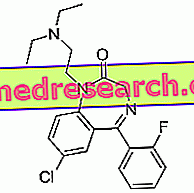LYSEEN ® is a medicinal product based on Pridinol mesylate
THERAPEUTIC GROUP: Central and peripheral muscle relaxants
IndicationsAction mechanismStudies and clinical effectiveness Usage and dosage instructionsWarnings Pregnancy and lactationInteractionsContraindicationsUndesirable effects
Indications LYSEEN ® - Pridinol
LYSEEN ® is indicated for the treatment of muscle pain, central and peripheral contractures, lumbago and stiff neck.
Mechanism of action LYSEEN ® - Pridinol
LYSEEN ® is a medicinal specialty based on Pridinol mesylate, an active ingredient derived from piperidinpropilic alcohol, and has central and peripheral muscle relaxant activity.
From the molecular point of view Pridinol exerts a atropine-like action on the level of smooth and striated muscles, interacting and blocking the muscarinic receptors expressed by the effector organs innervated by post-ganglionic fibers, thus exerting a peripheral and decidedly muscle relaxant spasmolytic action.
Studies show that this molecule can also act at the level of the central nervous system, inhibiting some motor centers involved in the regulation of muscle tone, thus determining a central action muscle relaxant activity.
Following oral or parenteral administration, Pridinol mesilate is rapidly absorbed, reaching its maximum plasma concentration within the first hour, biodistributing uniformly throughout the body, to be subsequently excreted by sulfur and glucoronate predominantly via the kidney.
Studies carried out and clinical efficacy
LYSEEN IN THE TREATMENT OF SPASTIC PARALYSIS IN PATIENTS WITH MENTAL DISORDERS
Przegl Lek. 1969 Apr 14; 25 (4): 375-6.
Study that in light of the modalities of action of Pridinol tries to characterize its clinical efficacy even in small patients with mental disorders complicated by spastic paralysis.
LYSEEN IN THE TREATMENT OF THE VERTEBRAL SYNDROME
Schweiz Rundsch Med Prax. 1975 Nov 4; 64 (44): 1423-4.
Very old German study that lays the foundations of treatment with Pridinol in vertebral syndrome, also achieving good therapeutic success.
PRIMINOL MESILATE AND MUSCULAR PAIN
Boll Chim Farm. 1985 Aug; 124 (8): 102S-107S.
An old Italian study that seeks to characterize the therapeutic activity of Pridinol mesylate compared to that of imidazole 2 hydroxybenzoate in the treatment of post-traumatic muscle pain, with promising results.
Method of use and dosage
LYSEEN ®
Injectable solution for intramuscular use from 2 mg of Pridinol mesilate per vial;
Pridinol mesylate 4 mg tablets;
Suppositories of 6 mg of Pridinol mesilate.
The choice of dosage, format and therapeutic scheme is up to the doctor after carefully evaluating the patient's general health and the severity of his clinical picture.
Generally during the attack phase, for which parenteral administration of the drug is recommended, it can be followed by maintenance with tablets and suppositories.
Different therapeutic schemes are instead recommended in the case of nocturnal cramps.
Warnings LYSEEN ® - Pridinol
LYSEEN ® therapy must be preceded by a careful medical examination aimed at identifying the potential causes and origins of the complained pain and the consequent prescriptive appropriateness.
Medical supervision would also be necessary during treatment, in order to identify possible side effects early and therefore promptly remedy.
The effectiveness of LYSEEN ® therapy is greater as soon as it is established.
The use of LYSEEN ® must be carried out with particular caution in patients suffering from renal insufficiency, impaired renal function and hypotension.
LYSEEN ® in tablets contains lactose, therefore it is not indicated in patients with lactase enzyme deficiency, glucose-galactose malabsorption syndrome and galactosemia.
The presence of parahydroxybenzoates in LYSEEN ® suppositories, could instead increase the risk of adverse reactions from hypersensitivity, especially in atopic patients.
PREGNANCY AND BREASTFEEDING
The absence of studies able to better characterize the safety profile of Pridinol for the health of the fetus and infant, extend the aforementioned contraindications to the use of LYSEEN ® also to pregnancy and the subsequent period of breastfeeding.
Interactions
The simultaneous administration of anticholinergics could increase the biological effects of Pridinol.
Contraindications LYSEEN ® - Pridinol
The use of LYSEEN ® is contraindicated in patients suffering from glaucoma, prostatic hypertrophy, urinary retention syndromes or intestinal obstruction and tachyarrhythmia, in patients who are hypersensitive to the active ingredient or to one of its excipients and to pregnant and lactating women.
Undesirable effects - Side effects
Although the use of LYSEEN ® is generally safe and well tolerated, sometimes the intake of Pridinol could cause the appearance of asthenia, dry mouth and very rarely dizziness and lightheadedness.
Even more rare are the adverse reactions worthy of clinical observation, such as hypersensitivity to the active ingredient.
Note
LYSEEN ® is a prescription-only drug.



